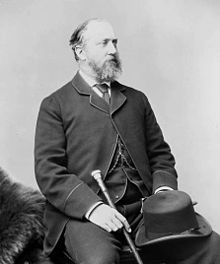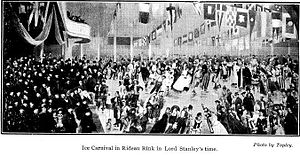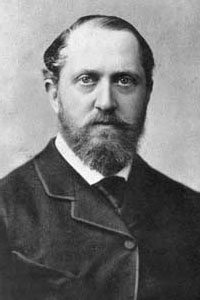Frederick Stanley, 16th Earl of Derby
PC | |
|---|---|
 | |
| 6th Governor General of Canada | |
| In office 1 May 1888 – 18 September 1893 | |
| Monarch | Queen Victoria |
| Prime Minister | John A. Macdonald John Abbott John Thompson |
| Preceded by | The Marquess of Lansdowne |
| Succeeded by | The Earl of Aberdeen |
| President of the Board of Trade | |
| In office 3 August 1886 – 21 February 1888 | |
| Monarch | Victoria |
| Prime Minister | The Marquess of Salisbury |
| Preceded by | A. J. Mundella |
| Succeeded by | Sir Michael Hicks Beach, Bt |
| Secretary of State for the Colonies | |
| In office 24 June 1885 – 28 January 1886 | |
| Monarch | Victoria |
| Prime Minister | The Marquess of Salisbury |
| Preceded by | The Earl of Derby |
| Succeeded by | The Earl Granville |
| Secretary of State for War | |
| In office 2 April 1878 – 21 April 1880 | |
| Monarch | Victoria |
| Prime Minister | The Earl of Beaconsfield |
| Preceded by | Gathorne Hardy |
| Succeeded by | Hugh Childers |
| Personal details | |
| Born | 15 January 1841 London, England |
| Died | 14 June 1908 (aged 67) Holwood, Kent, England |
| Nationality | British Canadian |
| Political party | Conservative |
| Spouse |
Lady Constance Villiers
(m. 1864) |
| Children | 10, including: |
| Parents | |
| Unit | Grenadier Guards 1st Royal Lancashire Militia 5th Battalion, King's Regiment (Liverpool) |
Frederick Arthur Stanley, 16th
Background and education
Stanley was the second son of Prime Minister
Political career
As the Hon Frederick Stanley he served as a Conservative Member of Parliament (for
Governor General of Canada

Stanley was appointed the Governor General of Canada and Commander in Chief of Prince Edward Island on 1 May 1888.[1][2] During his term as Governor General, he travelled often and widely throughout the country. His visit to western Canada in 1889 gave him a lasting appreciation of the region's great natural beauty as well as permitting him to meet the people of Canada's First Nations and many western ranchers and farmers. During his visit, he dedicated Stanley Park, which is named after him. He also experienced the joys of fishing and avidly pursued the sport whenever his busy schedule allowed. As governor general, Stanley was the third holder of that office to whom Queen Victoria granted the power of granting pardons to offenders or remitting sentences and fines and the power of mitigating capital or any other sentence.[2]
When
Stanley's wife, whom
Stanley Cup

Stanley's sons became avid ice hockey players in Canada, playing in amateur leagues in Ottawa, and Lord and Lady Stanley became staunch hockey fans. In 1892, Stanley bequeathed to Canada a trophy today named in his honour as the Stanley Cup, known originally as the Dominion Hockey Challenge Cup. He originally donated the trophy as a challenge cup for Canada's best amateur hockey club, but in 1909, it became contested for by professional teams exclusively. Since 1926, only teams of the National Hockey League have competed for the trophy. This now-famous cup bears his name as a tribute to his encouragement and love of outdoor life and sport in Canada and in recognition, he was inducted into the Hockey Hall of Fame in 1945 in the "Honoured Builders" category. The original size of the trophy was 7 inches (180 mm) and is now around 36 inches (910 mm) and weighs 35 pounds (16 kg).
Later years

Stanley's term as Governor General of Canada was due to end in September 1893. However, in April of that year, his elder brother, the 15th Earl of Derby, died. Stanley succeeded him as the 16th Earl of Derby.[1] As a result, Stanley, now known as Lord Derby, left Canada on 15 July 1893 and returned to England. An administrator was appointed to fulfil his duties until Lord Aberdeen was sworn in that September.
Also in 1893, Toronto's "
During the last years of his life, he increasingly dedicated himself to philanthropic work. He was founder president of the committee for the building of Liverpool Cathedral in 1901.[8] He helped fund the Coronation Park, Ormskirk, in 1905.[9]
Family


Derby married Lady Constance Villiers, daughter of
Their 10 children (8 boys; 2 girls) were:[1]
- Edward George Villiers Stanley (1865–1948), who succeeded his father as 17th Earl of Derby.
- Katherine Mary Stanley (circa 1866-21 October 1871).
- Hon. Sir Victor Albert Stanley (1867–1934), was an Admiral in the Royal Navy who married a Canadian lady, the daughter of Hon. C. E. Pooley, KC, of British Columbia.[10]
- Hon. Sir Arthur Stanley (1869–1947).
- Geoffrey Stanley (18 November 1869 – 16 March 1871).
- Hon. Ferdinand Charles Stanley, was educated at Wellington and Sandhurst, before joining the King's Royal Rifle Corps in 1891, rising to the rank of Brigadier-General. He married the Hon. Alexandra Fellowes, the eldest daughter of William Henry Fellowes, Baron de Ramsey; they lived at 8 Cornwall Terrace, Regent's Park, London, now renamed Stanley House.[11]
- Lt.-Col. Rt. Hon. Governor of Madras. Married Lady Beatrix Taylour (died 1944), daughter of Thomas Taylour, 3rd Marquess of Headfort; they had a daughter.
- Hon. Col. Algernon Francis Stanley (1872–1962), married the widow Mary Cavendish Crichton (her late husband Lt-Col. Henry William, son of John Crichton, 4th Earl Erne was KIA in 1914 on the Western Front), daughter of Hugh Grosvenor, 1st Duke of Westminster. They had one son and a daughter.
- Lady Isobel Gathorne-Hardy, was their longest-living child, living until 1963. She was instrumental in convincing her father to create the Stanley Cup.[12] She is mentioned in one of the first games of women's hockey, played at Rideau Skating Rink in 1899. Her role as a women's hockey pioneer is recognized in women's hockey with both the Isobel Gathorne-Hardy Award, given across women's hockey in Canada, and the Isobel Cup, the Premier Hockey Federation's championship trophy.
- Lt.-Col. Hon. Frederick William Stanley (1878–1942), married Lady Alexandra Louise Elizabeth Acheson, the daughter of Archibald Acheson, 4th Earl of Gosford and Louisa Acheson, Countess of Gosford on 17 June 1905. They had one son and two daughters, one of whom married the son of Lieutenant-General Sir George Sidney Clive. He would go on to serve and be wounded in the Second Boer War, and later the First World War.
Derby died on 14 June 1908, aged 67, and was succeeded by his eldest son, Edward, who also became a distinguished politician. Lady Derby died on 17 April 1922.[1]
Legacy
After Edward Whymper made the first ascent of Stanley Peak in 1901, he named the mountain after Lord Derby. Vancouver's Stanley Park and Stanley Theatre were also named after him,[13] as was Stanley Park, Blackpool.
The Preston Squadron of cadets at the
The Dominion Hockey Challenge Cup is today known as the Stanley Cup and is awarded to the winning team of the National Hockey League playoffs each season. In October 2017, Lord Stanley's Gift Monument was erected in Ottawa at Sparks Street and Elgin Street, near the location of the dinner party announcing the Cup at the Russell House, which has since been demolished.[14]
Stanley Quay, later renamed Stanley Street, in Brisbane, Australia, was named after him at the time he was Colonial Secretary.
Honorary degrees
- LL.D) in 1889[15]
Honorific eponyms
- Stanley, New Brunswick
- Stanley, Nova Scotia
- Port Stanley, Ontario
- Stanley (Oliver Paipoonge), Ontario
- Stanley Park, Vancouver, British Columbia
- Stanley Park, Liverpool, UK
- Stanley Peak (Ball Range) (British Columbia)[16][17][18]
- Rue Stanley, Montréal, Québec[19]
- Stanley Avenue, Victoria, British Columbia
- Stanley Street, Brisbane, Queensland
- Stanley Street, Townsville, Queensland
Arms
See also
- List of statues and sculptures in Liverpool
- List of attractions and monuments in Stanley Park
Notes
- ^ a b c d e f g h Burke's, 'Derby'.
- ^ a b c d e f "Canada's Executive Head; Power and Emoluments of the Governor General. Almost Unlimited Authority Granted to Him – An Expensive Luxury for Canadians Who Want to Choose Their Own Governor", The New York Times, 5 November 1891.
- ^ a b Army List.
- ^ Williamson & Whalley, pp. 329–30; Appendix B.
- ^ Grand Lodge of British Columbia and Yukon: A few famous freemasons.
- ^ "Election of Mayors". The Times. No. 36609. London. 11 November 1901. p. 7.
- ^ "Court Circular". The Times. No. 36932. London. 22 November 1902. p. 12.
- ^ Riley, Ken (1987). Liverpool Cathedral. Fine Art Publications. pp. 16–17.Guide to the Anglican cathedral.
- ^ Broady-Hawkes, Dot (21 June 2015). "Ormskirk Nostalgia: Happy birthday to Coronation Park – 120 years old this month". Southport Visitor.
- ^ Morgan, Henry James, ed. (1903). Types of Canadian Women and of Women who are or have been Connected with Canada. Toronto: Williams Briggs. p. 323.
- ^ "Cornwall Terrace". Archived from the original on 12 October 2012.
- ^ "Biographies". CBC.ca. Retrieved 29 September 2009.
- ^ Mathison, Emily. "Things That Go Bump in the Night: Unearthly spirit sightings at a local landmark" Archived 29 December 2006 at the Wayback Machine Retrieved on 9 May 2008.
- ^ "Invitation: Monument Unveiling". lordstanleysgift.com. 18 October 2017. Retrieved 13 November 2017.
- ^ "Archived copy" (PDF). Archived from the original (PDF) on 4 March 2009. Retrieved 7 March 2009.
{{cite web}}: CS1 maint: archived copy as title (link) - ^ "Stanley Peak British Columbia #1538". Bivouac.com. Archived from the original on 21 March 2016. Retrieved 12 June 2012.
- ^ "Stanley Peak". Peakware.com. Archived from the original on 4 March 2016.
- ^ "Stanley Peak". cdnrockiesdatabases.ca. Retrieved 12 June 2012.
- ^ Stanley Street (Montreal)
References
- Burke's Peerage, Baronetage and Knightage, 100th Edn, London, 1953.
- Waite, P.B (1994). "Stanley, Frederick Arthur, 1st Baron Stanley and 16th Earl of Derby". In Cook, Ramsay; Hamelin, Jean (eds.). Dictionary of Canadian Biography. Vol. XIII (1901–1910) (online ed.). University of Toronto Press.
- Maj R.J.T. Williamson & Col J. Lawson Whalley, History of the Old County Regiment of Lancashire Militia, London: Simpkin, Marshall, 1888.
External links
- Hansard 1803–2005: contributions in Parliament by the Earl of Derby
- Website of the Governor General of Canada
- Biographical information and career statistics from Legends of Hockey
- Lord Stanley's Glacier hike
- Photograph: Lord Stanley in 1889. McCord Museum
- Photograph: Lord Stanley in 1889. McCord Museum
- Photograph: His Excellency Lord Stanley and snowshoes in 1890. McCord Museum


